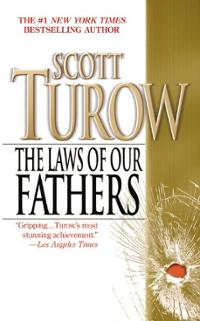'The Laws of Our Fathers'
by Scott Turow
Farrar, Straus & Giroux, $26.95
Scott Turow's new courtroom drama is a 500-page clunker that keeps you hoping until the end for a signature plot twist that might catapult an otherwise tedious book into the realm of great popular literature.
No such luck. Unfortunately, there just isn't much here to keep you awake nights.
This is surprising because Turow, the author of several bestsellers, including "Presumed Innocent," is famous for devilish courtroom thrillers that draw on his background both as a federal prosecutor and a partner in a large Chicago law firm. Turow usually combines thoughtful writing with surprising plots. But not here.
In a way, you know what "The Laws of Our Fathers" is like from the moment you open the cover, which emphasizes its focus on the 1960s. Set in Kindle County - the Chicago-like locale of all Turow's novels - it revolves around a trial for the murder of June Eddgar, the ex-wife of a prominent state senator, who was gunned down near a gang-infested high-rise housing project.
Sonia "Sonny" Klonsky, a character who first appeared in Turow's "Burden of Proof," is now the judge presiding over the bench trial - which means that she, not a jury, will decide the guilt or innocence of Nile Eddgar, the son who is accused of plotting the contract killing of his mother. To compound Sonny's difficulty, virtually everyone involved in the trial knew each other in California in the 1960s, when all were deeply involved in the era's antiwar protests, riots, campus bombings and hippie life.
Feels like a `Big Chill'
The trial, in fact, is a "Big Chill" reunion of sorts, and the novel relies heavily on flashbacks. Twenty-five years earlier, Judge Klonsky was a college student half-heartedly dating fellow student Seth Weissman, who was desperately in love with her. Weissman provided day care for young Nile Eddgar, the son of faculty revolutionaries Loyell and June Eddgar.
Weissman's flamboyant African-American friend, Hobie Tuttle, drifted in and out of the Eddgars' campus underground. But the fabric of these friendships was shredded when Weissman ran from the draft, Sonny refused to join him, the Eddgars were expelled from the faculty, and the FBI began to close in.
More than two decades later, this group reconvenes for a trial in which the charges against Nile are supported by the damning testimony of his father, now a state senator, and Ordell Trent, a drug-dealing gang leader known as "Hardcore" who admits to conspiring with Nile.
Nile, meanwhile, is represented by - surprise! - none other than Hobie Tuttle, now a respected defense lawyer. Tuttle savages the prosecution's key witnesses with withering cross examinations any lawyer would love, but at the same time he angers Judge Klonsky with his unethical tactics.
Rekindling in Kindle?
Weissman, now a nationally syndicated columnist (who writes for the Seattle Post-Intelligencer), flies into Kindle County to cover the trial. Divorced and recovering from the traumatic death of his young son, Weissman seeks to rekindle his relationship with Sonny Klonsky. She struggles to keep the trial on course, amidst the tangled history of the group and the glare of publicity, while confronting her own feelings for Weissman.
This might have been the foundation for a gripping climax, but Turow resolves the murder trial more than 100 pages before the end of the book, leaving readers in suspense, awaiting one of his patented jaw-dropping plot twists. I'm still waiting.
Instead, a lengthy anticlimax resolves the Klonsky-Weissman relationship, and the reader is left with something which - given Turow's sparkling literary history - is perhaps more surprising: a dud.
